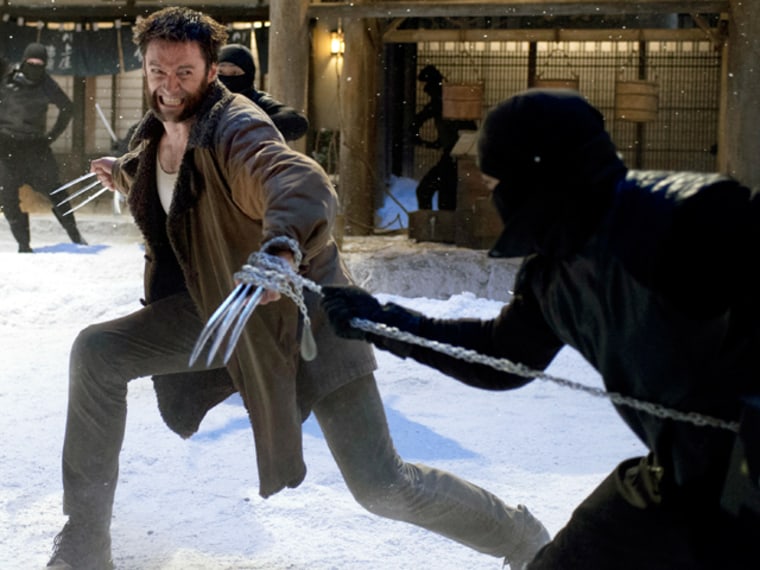Comic book superheroes may be an American creation, but these days they are earning their keep at theaters outside the United States.
Ever since "Thor" stormed theaters in 2011, superhero films have taken in more than half of box-office earnings abroad. In the past two years, eight out of 11 superhero films earned between 58 and 66 percent of ticket sales outside the United States. Those foreign returns are now underwriting the future of lucrative franchises, say analysts.
The stakes are high. Disney Studios will spend billions to produce Marvel movies with intertwined storylines over the coming years. Warner Bros. looks prepared to follow suit with its DC Comics properties.
"It's a recipe for success, but a recipe that has to have ingredients from all over the world," said Paul Dergarabedian, president of Hollywood.com's box-office division.
To justify a sequel, studios need to drum up about $400 million in ticket sales, said Jeff Bock, an analyst at ERC Box Office, and it's becoming harder to hit that target in North America alone.
You don't have to look farther than this summer's "The Wolverine," said Bock. It had the weakest U.S. opening of all six films in the "X-Men" franchise, but scored the biggest opening weekend abroad. To date, 64 percent of tickets sales for "The Wolverine" have come from overseas.
"This is a huge reversal, and we're going to see this next year with the new 'X-Men' film. We're going to see an even wider margin," said Bock.
(Read more: Blockbuster busts: Big summer flicks in peril)
Comic book adaptations are catching up to the broader trend in Hollywood. Foreign revenue has accounted for about two-thirds of U.S. studios' box-office haul for years. In the decade up to 2011, comic book adaptations typically pulled in between 45 and 55 percent of ticket sales overseas.
While Europe, Japan and Australia remain big markets, much of the growth is coming from big emerging nations.
Part of that is because of the explosion of modern theaters with IMAX and 3-D screens in emerging markets. "The novelty has worn off here, but it's still very big in China, in Russia, in Brazil," said Bock.
Last summer, "The Amazing Spider-Man" did $48.8 million at theaters in China, nearly 10 times what the original 2002 "Spider-Man" earned there. In Russia, the new Spidey did nearly six times as well. In Brazil and South Korea, it nearly doubled the original's sales.
That trend holds out in Asia and Latin America. Grosses from the rebooted "Spider-Man" doubled or tripled the original's returns in places like Indonesia, Malaysia, Venezuela and Argentina.
Studios are also debuting movies ahead of U.S. releases to beat bootleggers to the punch. Those releases also make international audiences feel like they are not just an afterthought, said Dergarabedian.
"That's a big marketing tool for the studios to be able to go into these different international territories and say, 'You get to see it first,'" said Dergarabedian.
(Read more: Higher movie ticket prices, but moviegoers can still save)
Securing a rare pre-U.S. opening in China, the second-biggest market for Hollywood, helped "Iron Man 3" earn $121 million in the country, said Rob Cain, president of consulting and production company Pacific Bridge Pictures.
Much of the buzz around "Iron Man 3" in China swirled around Disney including extra Chinese content, but Cain believes getting marketing allowances not typically afforded foreign films played a bigger role in its success.
Those included permission to advertise for more than a year and a promotional segment on state television's "New Year's Gala," the most watched program of the year.
But Cain warns other heroes looking to conquer China should not count on the same leeway.
"There's no secret that the Chinese film administration has a policy that really favors domestic films and tries to protect them," said Cain. "Unless something dramatically changes, these Hollywood films are going to have a glass ceiling on them."
Still, Disney's commitment to making "Iron Man 3" a blockbuster in China is a sign of the times, said Dergarabedian.
"That is the single-biggest indicator of how important the international marketplace is—to spend that kind of money," he said. "That tells you a lot about how influential those markets are."
—By CNBC's Tom DiChristopher. Follow him on Twitter @tdichristopher.
